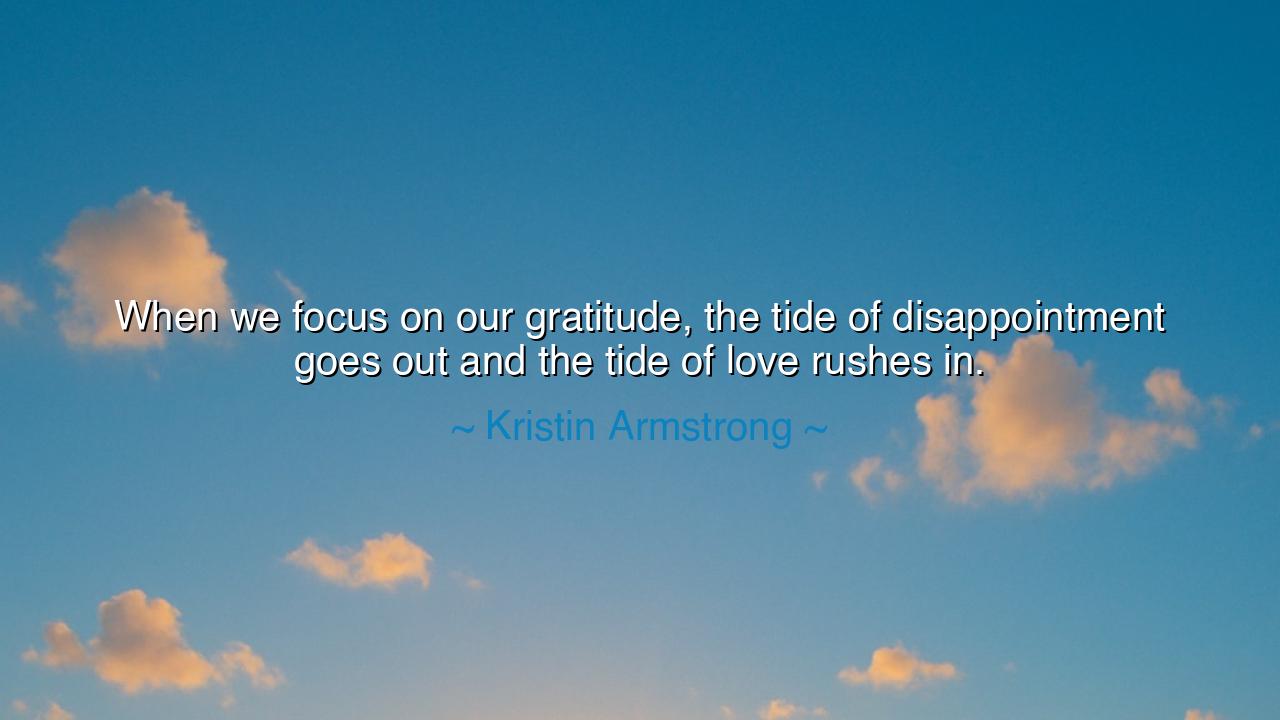
When we focus on our gratitude, the tide of disappointment goes
When we focus on our gratitude, the tide of disappointment goes out and the tide of love rushes in.






“When we focus on our gratitude, the tide of disappointment goes out and the tide of love rushes in.” Thus spoke Kristin Armstrong, a woman who, like the great sages of old, learned her deepest wisdom not in comfort, but in challenge. Her words are gentle in tone, yet mighty in spirit — a reminder that gratitude is the alchemy that transforms sorrow into strength, scarcity into abundance, and pain into peace. In this simple metaphor of the tides, she captures the eternal rhythm of the human heart: when we turn our gaze from what we lack to what we cherish, the bitterness of disappointment recedes, and in its place, the ocean of love rises to fill our souls.
To understand her saying is to understand the nature of the human heart itself. For disappointment is born from expectation — from the belief that life owes us something beyond what we have been given. But gratitude, the quiet wisdom of the soul, teaches us that all things — joy and sorrow, gain and loss — are gifts in disguise. When Armstrong speaks of focusing on gratitude, she calls us to awaken our awareness, to see that the simple act of thankfulness can change not the world outside us, but the world within us. The tide of disappointment withdraws because the heart that is grateful cannot harbor despair; the two cannot coexist, just as sunlight banishes shadow.
In her own life, Kristin Armstrong — author, mother, and advocate of mindful living — learned this truth through hardship and renewal. Once married to a world-renowned athlete, she faced public heartbreak and personal upheaval. Yet rather than drown in resentment, she chose to turn inward, to discover a deeper strength. Through the practice of gratitude, she found serenity where once there had been sorrow. Out of this transformation came her realization: that gratitude is not the denial of pain, but its redemption. By focusing on what remains good and beautiful, even in loss, one opens the heart to the tide of love — love for life, for others, and for oneself.
This wisdom is as ancient as it is enduring. The Stoic philosopher Epictetus once taught, “He is a wise man who does not grieve for what he has not, but rejoices in what he has.” And centuries later, saints and poets would echo the same truth: that the one who counts his blessings walks in light, while the one who counts his misfortunes remains in darkness. Gratitude is not merely emotion; it is discipline — a daily turning of the heart toward the good, even when the storm clouds gather. In the language of Armstrong’s quote, it is the act of choosing to let love’s tide rush in, again and again, each time disappointment seeks to drown us.
Consider the life of Helen Keller, who was both blind and deaf from childhood. She could have lived in despair, yet she chose gratitude. “I thank God for my handicaps,” she once said, “for through them I have found myself, my work, and my God.” Her heart, though deprived of sight and sound, overflowed with joy. This is the very essence of Armstrong’s teaching — that by focusing on what we can give thanks for, we open ourselves to the infinite current of love that flows through all creation. Gratitude, then, is not a passive feeling but a sacred power that changes the soul’s direction from yearning to fulfillment.
The ancients would tell us that the grateful heart is a vessel fit for the divine. It cannot be filled with bitterness, for gratitude purifies; it cannot be weighed down by envy, for gratitude enlightens. When the tide of disappointment threatens to rise, gratitude becomes the moon that pulls it away, allowing the waters of love to return. For where there is gratitude, there is humility; and where there is humility, there is love — love that embraces the world not as it should be, but as it is.
So, my child, learn this sacred art. When life wounds you, do not dwell on what was taken, but give thanks for what remains. When your heart feels empty, list aloud the things still beautiful — the breath in your chest, the warmth of the sun, the memory of kindness. Speak them, and the tide will turn. Slowly, the waters of gratitude will wash over your pain, and love will return — not as a fleeting visitor, but as a faithful companion.
For in the end, gratitude is the doorway to grace, and grace is the birthplace of love. The one who practices it will find that life, though imperfect, is infinitely precious. And each dawn will whisper the same truth that Kristin Armstrong discovered: when we give thanks, the tide of disappointment goes out — and the eternal tide of love rushes joyfully in.






AAdministratorAdministrator
Welcome, honored guests. Please leave a comment, we will respond soon